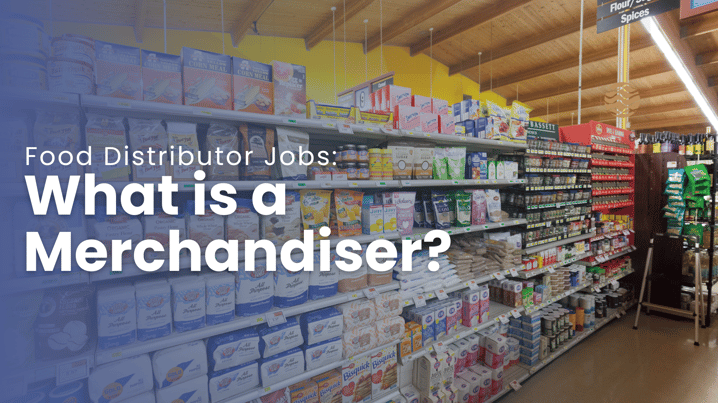Food Distributor Jobs: What is a Merchandiser?

While most people think of marketing as a group of creatives presenting flipcharts around a boardroom table, there are numerous other levels of the industry that range from social media campaigns to product placement and packaging.
Companies that sell food must consider how best to identify and appeal to their target audience at each step of the process, ending with the final stage of marketing—merchandising.
What is a merchandiser?
Merchandisers are a crucial part of in-person commerce. While individual roles and responsibilities will vary from company to company, a merchandiser’s job is to manage inventory and ensure that consumer packaged goods (CPGs) are stocked and displayed correctly on retailer shelves. Merchandisers are also often responsible for collecting and analyzing sales data and using the data to inform marketing decisions and order sizes.
This type of role is especially important in grocery stores, where goods must constantly and consistently be stocked and re-stocked as they sell through or cycle through their sell-by date.
What does a merchandiser do?
Whether the merchandiser works for the CPG brand itself, the food distributor who delivers it, or the store that sells it, each party along the supply chain relies on merchandisers to make products available and appealing to consumers. For the purposes of this article, we’ll primarily focus on CPG and food distribution marketing.
Retailer merchandising
Much of what you see stocked in a grocery store was merchandised by grocery store employees. These merchandisers will take inventory and restock shelves with products from backstock. Without a special interest in any particular brand, in-store merchandisers focus on the appearance of the store and the overall shopping experience.
CPG merchandising
Brands will sometimes hire merchandisers to visit stores that sell their products and make sure their brand is represented well and that shelves are fully stocked. These types of merchandisers are likely to take note of how well the distributor or store has done stocking their brand and provide feedback.
Food distribution merchandising
Food distributors collect product shipments from CPG manufacturers and deliver them to retail stores and/or warehouses. Full-service distributors (like Buffalo Market) will also sometimes handle merchandising, where they take ownership of a brand’s shelf space and ensure their delivery gets displayed and stock is rotated. This type of service is called Direct Store Delivery (DSD) distribution. Food distribution merchandisers may also be responsible for issuing invoices and removing stock that has passed its sell-by date.
What skills do you need to be a merchandiser?

You don’t necessarily need a college degree or trade certification to be a merchandiser, but CPG and food distribution merchandisers will likely be required to have a driver’s license and be able to drive a cargo van or box truck. While you may not need a degree or certificate to work in this field, certain skills will give you a better chance of success as a grocery merchandiser.
1. Attention to detail
It’s important that merchandisers take great care in their work so that the products are displayed neatly, and that older products are sold before newer ones, which reduces food waste and revenue loss.
2. Organizational skills
Making sure deliveries are accurate and timely requires the merchandiser to be organized and efficient throughout their workflow.
3. Self-motivation
Because grocery merchandisers often work alone, it’s critical that they’re able to self-start and not wait on too much direction from others.
4. Interpersonal and communication skills
Even though CPG and food distribution merchandisers work alone much of the time, they still must represent their brand or company, so it’s imperative that they’re able to act professionally and maintain positive relationships with stores and the customers that shop in them.
Is a merchandiser a good job?
Yes! Merchandising is a stable career path with plenty of job security. If you work with the right company, you’ll find yourself in a role that provides you with autonomy, flexibility, and the feeling of independence that follows.
How much do merchandisers make?
The average salary of a grocery merchandiser in the United States is about $65,500 a year, and they typically receive a commission on any of the goods sold on their account. The more accounts a merchandiser services and the more products sold along their route, the more they stand to make on commission.
Work as a grocery merchandiser at Buffalo Market
Buffalo Market is the most efficient, transparent, and brand-friendly food distributor in the industry. We specialize in working with the fastest-moving products and the largest retail chains in the country.
Our app, Stampede, gives our delivery drivers and merchandisers all of the tools they need for success. Know how to ride a motorcycle? You might be a good fit for our Ninja program.
If you’d like to join a fast-growing, tech-forward company on a mission to make better food more accessible across the United States, send us a message today!
What about food distributor jobs near me?
If you're looking for a food distributor that's more local to you, check out some of our regional lists:




